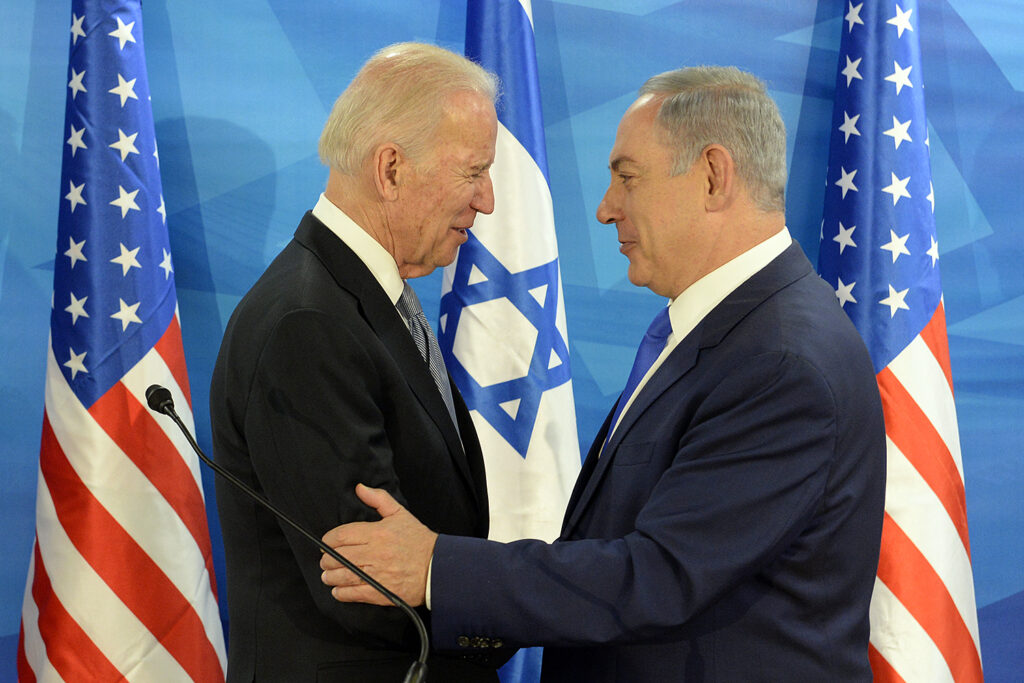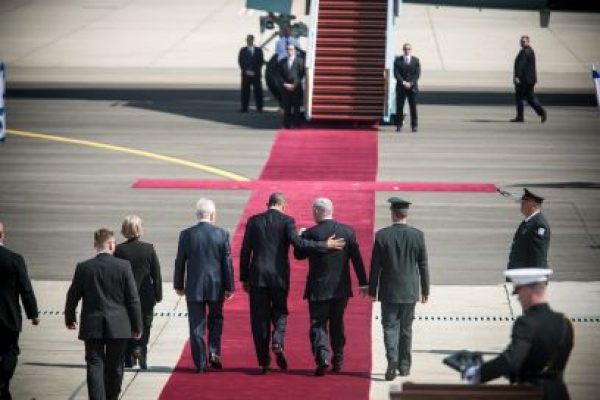We Are Not One: A History of America’s Fight Over Israel
Eric Alterman
Basic Books, $35 (cloth)
The 1967 Arab-Israeli War cemented Israel’s role in American Jewish identity. After the war, Shaul Magid writes, the “Jewish discourse about Zionism [became] Jewish identity itself.” Rabbi Alexander Schindler, a leader of Reform Judaism, characterized the attachment to Israel as “a kind of kidney machine, without which [American Jews] cannot live.” In 2022 William Daroff, the CEO of the Conference of Presidents of Major American Jewish Organizations, said that Israel is “a key foundation of twenty-first century American Judaism.”
That wasn’t always true. In the early 1900s, Jews in the United States and elsewhere largely rejected Zionism as a fringe movement. Lacking statehood and control of a territorial home, religious Jews were more likely to await divine rather than human redemption in the ancient Land of Israel. Most Jews voted with their feet to stay in Europe and across the Ottoman Empire, and those who migrated from Europe and Russia primarily went west to the Americas. Even after Israel gained independence in 1948, the Jewish community remained split on support for Israel. Most American Jews appreciated the new country, helped, as Eric Alterman writes in his new book, We Are Not One: A History of America’s Fight Over Israel (2022), by the 1958 Leon Uris book, Exodus, and its 1960 movie adaption starring Paul Newman. But the public narrative of the 1967 War deeply resonated among Jews in the United States.
In the face of a likely Arab onslaught—what the public feared would have amounted at the time to a second Holocaust—Israel launched a surprise attack that decimated its Arab rivals. Israel captured large swathes of land from the Arab states and more than tripled in size. On the eve of the war, many U.S. and Israeli military officials had privately expected a rapid Israeli victory. The massive victory and the capture of biblical lands energized and activated segments of Jewish populations in both Israel and the United States.
The war also led to “the sudden sacralization of the Shoah,” which was deeply intertwined with the invigorated American Jewish commitment to the State of Israel. Israel became both an ideological and physical Jewish haven as the memory of the Holocaust was linked to the idea that only the existence of a Jewish state could guarantee protection from a genocidal attack against Jews anywhere. That the eve of the 1967 War felt like it could have been the prelude to another genocide reinforced this notion, as the existence of the State of Israel and its armed forces protected the Jewish people. If this guarantee meant that universalism had to be sacrificed, so be it.
In the 1970s and ’80s, many American Jews backed pro-Israel interest groups in Washington, D.C., which quickly gained resources and political influence. By the late 1990s most Jewish leaders not only embraced Israel for the country’s sake but also believed that supporting Israel was key to the survival of U.S. Jews—the largest diaspora Jewish community. Since 1967 Israel’s centrality to Jewish identity has only deepened. The most obvious manifestation is the Birthright program, which was launched in 1999 and has since brought more than 800,000 young American Jews on entirely free ten-day or two-week trips to Israel, with many of its participants visiting the country for the first time. This year the State of Israel celebrates its seventy-fifth anniversary, marking less than a century of existence during which the country has shifted profoundly. Israel is now the most powerful state in the Middle East. Not only is it independent, wealthy, and nuclear-armed, it is also embraced by many Jewish cultural, political, and religious organizations around the world.
Alterman’s book then comes at an opportune time, tracking “the debate over Israel in the United States” and offering a close study of ethnoreligious identity, diaspora relations, and foreign policy as the landscape of Israeli support has grown increasingly complex. The book also teases out four important consequences of American Jews centering the Israeli state in Jewish identity. Though he generalizes about millions of people in doing so, he does identify important trends: first, Israel-centered Judaism has contributed to unconditional U.S. government support for Israeli governments, regardless of their policies and conduct toward Palestinians. Second, reactions to Israel have served to set the battle lines in important parts of the Jewish organizational world in the United States. Third, embracing Israel and its increasingly illiberal and repressive identity has meant neglecting Judaism’s strong social justice tradition. Lastly, centering Israel may have failed to give younger Jews a strong sense of Jewish identity or, more bluntly, a reason to remain committed to identifying as Jewish. In reaction to Israel’s illiberal policies, younger American Jews are becoming alienated from Judaism.
Since 1977 Israeli government and society have moved steadily rightward. With the important exceptions of the Oslo process and Israeli Prime Minister Ariel Sharon’s brief centrist push for unilateral action (for example, the Gaza Disengagement), Jewish nationalism and settlement have risen alongside continued rejection of Palestinian national rights. And with only occasional exceptions, the American Jewish mainstream has ardently defended Israel. Meanwhile, the organized Jewish community—along with evangelical Christian allies such as Christians United for Israel (CUFI)—has continually undermined substantive criticisms of Israeli policy from the progressive left. The American Israel Public Affairs Committee (AIPAC), the Conference of Presidents of Major American Jewish Organizations, and allied organizations have aimed to ensure that the U.S. government and media do not attack the Israeli government. When Israeli leaders have ignored or opposed a two-state solution, they have as well.
This enforced consensus has also dominated discourse on the core issue of Israel’s identity. For decades, while some Palestinian thinkers and leaders have pushed for one democratic state, American Jewish organizations have primarily insisted on maintaining Israel as the Jewish State. Organizations such as the short-lived Breira in the 1970s did demand that Israel change course and that the U.S. Jewish community use its voice to effect change. These alternatives, however, could never match the influence of AIPAC, the Conference of Presidents, the Anti-Defamation League (ADL), and similar organizations. When Palestinians, other governments, UN bodies, and human rights organizations decried Israel’s brutal occupation of Palestine and human rights abuses, the dominant part of the organized Jewish community would brook no dissent. They rhetorically attacked both the message and the messengers, blaming Palestinian terrorism and rejectionism for conflict and the absence of any peace agreement.
In the years since 1967, the U.S.-Israeli military alliance has also deepened tremendously. Alterman’s book depicts the interplay between U.S. cultural organizations and U.S. foreign policy, suggesting a range of factors that might have led to stronger ties between the two countries and billions of dollars of U.S. aid directed toward Israel: shared values, mutual national security interests, and U.S. domestic interest groups. To be sure, the U.S. government has actively supported the oppressive policies of allies in the Middle East such as Egypt and Saudi Arabia. But there is a certain irony in the explanation that shared democratic values have supported the U.S.-Israeli alliance. Maybe Israel’s long rightward turn toward repression and hypernationalism mirrored the United States’ own democratic backsliding.
U.S. Representative Jerrold Nadler (D-NY), a longtime supporter of Israel whose district is home to a large and diverse Jewish population, recently fretted in Ha’aretz that weakening checks and balances in Israel’s government could create a democracy gap undermining the existing alliance. Nadler’s op-ed points to the consequences of relying on Israel to undergird American Jewish identity: there is now a substantial disconnect between U.S. foreign policy toward Israel-Palestine and the perspectives of many American Jews. In recent years neither the Trump nor the Biden administration have meaningfully questioned Israeli policy. As Alterman succinctly details, Trump handed the Israeli government multiple concessions without reciprocation, including moving the U.S. embassy to Jerusalem and recognizing Israeli sovereignty over the occupied Golan Heights. The Biden administration has done little to reverse Trump’s actions. During the same period, a Jewish Electorate Institute survey found that “58 percent of American Jews supported restricting military aid to Israel to prevent its use in the occupied territories.” Biden, Trump, and today’s bipartisan congressional majority would never consider such a U.S. policy. In another survey in 2022, 34 percent of American Jews agreed that “Israel’s treatment of Palestinians is similar to racism in the U.S.” Yet when non-Jews claim that “Israel is racist,” the Israeli government and mainstream Jewish legacy organizations label such talk as antisemitic. I specify “legacy” organizations—such as AIPAC, the ADL, the Zionist Organization of America (ZOA), and the American Jewish Committee (AJC)—because American Jewish organizational life has fractured over the unwavering commitment to Israel. AIPAC will support any Israeli government regardless of its conduct and rightward movement.
In the past three decades, new American Jewish organizations have emerged to represent progressive Jewish positions on Israel and Palestine. For example, J Street (founded in 2007) and Jewish Voice for Peace compete on the same issues as AIPAC and represent a vastly different stance. Whereas AIPAC was willing to financially support the insurrectionist members of the Republican House who defended Israel’s policies, J Street rejected the practice. Indeed, J Street defines itself as pro-Israel but anti-occupation. At the same time, however, new Jewish organizations have also emerged that embrace Israel without regard to the occupation or its conduct. The late Sheldon Adelson, who gave “an estimated $426 million to Donald Trump and the Republican Party between 2016 and 2020,” was the major supporter of the Birthright program. He also funded the Israeli American Council (IAC), which states on its website its goal “to ensure a strong Jewish and Israeli identity for the next generations.” While the IAC aims to capitalize on the hundreds of thousands of Israeli Jews who have moved to the United States, the Maccabee Task Force is “determined to help students combat this [anti-Semitic] hate by bringing them the strategies and resources they need to tell the truth about Israel.” It also received Adelson funds. At the University of Connecticut, where I work, the Maccabee Task Force and UConn Hillel recently sent close to twenty undergraduates to travel to Israel and the West Bank during winter break.
Alterman blames fundraising for the disconnect between popular Jewish opinion and organizational policies. He writes that “despite their names, groups such as the American Israel Public Affairs Committee (AIPAC), the American Jewish Committee (AJC), and the United Jewish Appeal (UJA) are not in any democratic sense accountable to the community for whom they claim to speak. They are answerable only to the wealthy donors who control their boards of directors.” But the fracturing caused by these unaccountable organizations has also mobilized American Jews to create and join organizations that more closely represent their views.
Moreover, we are now seeing early signs of change in the Democratic Party—more members of Congress are willing to call out Israeli conduct and bring their concerns to the administration. Alterman also notes that both Senator Bernie Sanders and Senator Elizabeth Warren, two leading 2020 presidential candidates, expressed criticism of the Israeli government. Recently, on February 19, Sanders told CBS News “I think we’ve got to put some strings attached” to the billions of dollars in annual U.S. aid. Still, President Biden and most Democratic members of Congress have changed little, embracing Israel despite the occupation. In a position echoing many members of Congress, Ted Deutch, a former Democratic House member and current CEO of the American Jewish Committee, describes himself as a “lifelong Jewish and pro-Israel activist.”
The Democratic Party leadership has been slow to change for an array of reasons, including because of donors. Many Democrats don’t want to lose pro-Israel donors who need AIPAC’s stamp of approval before giving to a campaign. But there are other factors, too, many of which Alterman’s history tracks: interest group lobbying, laws that institutionalize U.S.-Israeli ties, precedent, the stickiness of the Israeli narrative about the need for a Jewish state to rebuff antisemitism, and the desire not to give the GOP the Israel wedge issue that it wants. Republicans believe they can gain votes by saying that Democrats hate Israel; Democratic politicians will hesitate to give them material.
The book examines how the American Jewish community might have evolved differently if they had not centered Israel in American Jewish identity. Judaism has a strong social justice tradition, invoking mandates such as tikkun olam (repairing the world) and gemilut chasidim (acts of loving kindness) to focus on domestic ills that plague U.S. society. Though smaller groups do that, such as Bend the Arc, Jews for Racial & Economic Justice, and Never Again Action, the Jewish organizational mainstream has a different priority. For example, Alterman notes that in 2022 the Jewish Federations of North America’s Public Priorities statement changed from supporting “gun control, voting rights, and LGBTQ protections” to championing “Jewish communal security and support for Israel.” The focus on Israel has sucked up resources too: Birthright trips to Israel have received hundreds of millions of dollars in donations, while educational and communal approaches associated with tikkun olam “have gone begging in recent decades.”
Not surprisingly, as Alterman notes, Israel is “growing increasingly unpopular among young people.” Younger American Jews have felt alienated from Israel—and perhaps from Judaism as well. The mythical version of Israeli history that U.S. legacy organizations promote “is so obviously belied by the reality they see there on the ground.” To Nadav Tamir, a former Israeli diplomat, Israel has become “more of a divisive element” than a unifying one. This represents a shift from seeing the country as a driver for American Jewish generational continuity.
But the political implications of American Jewish youth disaffection and even opposition don’t seem to concern Prime Minister Benjamin Netanyahu. The rise of Christian evangelical support for Israel since the Reagan era and the unwavering support from U.S. orthodox Jews has proven more than enough. Moreover, some on the Israeli religious right hardly consider many liberal U.S. Jews as Jews. And the divide between Netanyahu and American Jews might only grow as Israeli authorities consider changing definitions of “Jewish” in a way that would disqualify some liberal American Jews from identifying as Jews in Israel.
One important question Netanyahu isn’t properly considering is whether the growth of American Jewish disaffection with Israel will undermine the strong U.S.-Israeli military and diplomatic alliance. The Israeli right doesn’t think so, although Washington could pressure Israel to end the occupation and its suppression of the Palestinian right to self-determination. If the United States denied Israel access to advanced weaponry, refused to veto United Nations Security Council (UNSC) resolutions condemning Israeli abuses and violations of international law, and limited Israeli businesses access to the U.S. economy, Israel would be in a more tenuous position.
Today many American Jews, more distant not only from the Holocaust but also from the 1967 War, recognize Israel’s decades-long swing to the right and the ties between Israel’s right and anti-democratic forces in the United States. They cannot square a reactionary, hypernationalist occupier with their progressive values. As a result, they will either seek a different core to their Jewish identity or none at all. To the extent that popular support for Israel matters to U.S. foreign policy, a popular turn against Israel spearheaded by the next generation of American Jews could fundamentally change the United States’ relationship with the country.
We’re interested in what you think. Send a letter to the editors at letters@bostonreview.net. Boston Review is nonprofit, paywall-free, and reader-funded. To support work like this, please donate here.







